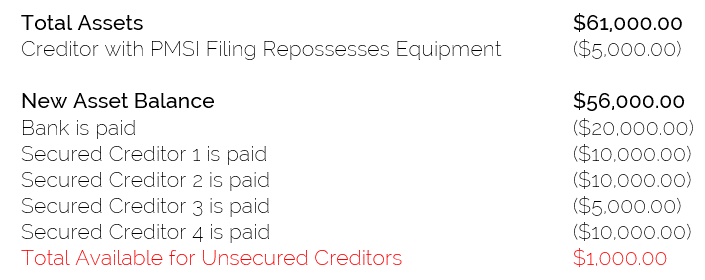
Double Bubble, Toil & Trouble: When Space & Noise Impact UCC Filings
As we prepare and review UCC filings, clients frequently ask us, “Does an extra space in my customer’s registered name really matter?” and “Does it matter whether I identify my customer as LLC if their registered name appears as L.L.C.?”
Two seemingly small issues, right? Wrong.
Article 9-102(71) clearly defines a registered organization and Article 9-503(1) clearly states the debtor’s name must be identified as it appears on the public organic record.
A financing statement sufficiently provides the name of the debtor:
(1)… if the debtor is a registered organization, or the collateral is held in a trust that is a registered organization, only if the financing statement provides the name that is stated to be the registered organization’s name on the public organic record of most recently filed with or issued or enacted by the registered organization’s jurisdiction of organization which purports to state, amend, or restate the registered organization’s name;
Recently, one creditor suffered the consequences of an inadvertently added space, after a noise word, in their debtor’s name, and the creditor’s security interest was unperfected.
Compliance with Article 9 & Seriously Misleading
As mentioned above, strict compliance with Article 9 of the Uniform Commercial Code is imperative. Failing to identify the debtor by its name as it appears on the public organic record could result in the filing being seriously misleading.
If it’s determined the Financing Statement is seriously misleading, the security interest can be deemed unperfected and priority can be lost.
What Makes the Name Seriously Misleading?
If a search for the Financing Statement, using the Standard Search Logic in the UCC filing office, fails to reveal the Financing Statement, the filing is considered seriously misleading, and thus, unperfected.
Standard Search Logic is the holy grail of determining whether a filing is seriously misleading. Search logic is created, determined & managed through an algorithm and varies by state filing office.
In 2015, International Association of Commercial Administrators (IACA) released the revised Model Administrative Rules, which include a specific section frequently referred to as “standard search logic.”
One standard search logic rule is 503.1.2: “No distinction is made between upper and lower case letters.” This means the debtor’s name could be entered as ABC COMPANY INC or ABC Company Inc, and both are acceptable.
Another rule addresses punctuation: 503.1.3 (b) “Punctuation marks and accents are disregarded. For the purposes of this rule, punctuation and accents include all characters other than the numerals 0 through 9 and the letters A through Z (in upper and lower case) of the English alphabet.”
IACA recognizes the general idea of “noise words”. Typically noise words include “and,” “the,” “inc” and “co.” Although noise words are addressed in the Model Administrative Rules, the list of actual noise words are determined by the individual filing office.
503.1.3 (c) The following words and abbreviations at the end of an organization name that indicate the existence or nature of the organization are “disregarded” to the extent practicable as determined by the filing office’s programming of its UCC information management system:
[Insert the filing office’s own “Ending Noise Words” list here.]
This difference by jurisdiction could mean a filing is simultaneously properly perfected in Virginia and deemed seriously misleading in Wisconsin, based on the jurisdiction’s search logic.
Double Bubble, Toil & Trouble
In United States Securities and Exchange Commission V. ISC, Inc., Dist. Court, WD Wisconsin 2017, creditor Double Bubble, Ltd.’s security interest was unperfected because of a small error in the debtor’s name on the Financing Statement.
Double Bubble, Ltd. (Double Bubble) filed a UCC to secure credit extended to ISC, Inc. (ISC). On the Financing Statement, Bubble identified ISC as “ISC, Inc .” At first glance, it appears correct, but close review reveals there is an extra space between the “c” and the “.” in “Inc.”
According to the court opinion, the receiver assigned to ISC, Inc. identified Double Bubble as an unsecured creditor because Double Bubble’s UCC did not appear in the receiver’s UCC search. The receiver searched for filings by “ISC, Inc.” which is ISC’s name as it appears on the public organic record.
An extra space after a typical noise word is a minor variance of the debtor’s name. Double Bubble argued that if the receiver had practiced reasonable diligence and altered its search, even to just “ISC,” Double Bubble’s UCC filing would have come up in the search.
The court agreed with Double Bubble’s argument in theory, but in practice the court held the filing was seriously misleading, therefore the filing was unperfected and Double Bubble’s creditor status was unsecured.
Text from the court’s opinion:
“The court has some sympathy for Double Bubble because the additional space would be easy to overlook, even if one were careful in filing the financing statement. And Double Bubble is correct that the receiver could have found its financing statement if he had used a different search, say a search simply for “ISC” with no punctuation or corporate designation. Double Bubble contends that such a search would have been “reasonably diligent.” But reasonable diligence is not the current standard.
“Seriously misleading” is a term of art with a statutorily defined meaning: a search “under the debtor’s correct name” must find the financing statement, otherwise it is seriously misleading. The fact that the DFI provides search “tips” and “hints” that might produce a broader set of results does not change the statutory standard. Double Bubble’s objection is overruled. Double Bubble will participate in phase II as an unsecured creditor.”
A Space at the End of a Noise Word, Really?
It may seem extreme. But, when it comes to perfection under Article 9, major or minor errors are still errors. And, unfortunately for Double Bubble, errors result in unperfected security interests.
Earlier I mentioned that standard search logic varies by state filing office. Double Bubble filed its UCC via Wisconsin Department of Financial Institutions (WDFI). And, the search logic WDFI uses does not account for errors such as an additional space.
Not the First, Certainly Not the Last
This isn’t the first time a creditor’s security interest has been invalidated because of “space.” In Receivables Purchasing Co., Inc. v. R & R Directional Drilling, L.L.C., the Georgia Court of Appeals determined the creditor did not have a security interest because the debtor’s name had an extra space listed.
The creditor added a space in the debtor’s name, listing it as “Net work Solutions, Inc.” The creditor requested the Georgia Superior Court Clerks Cooperative Authority (GSCCCA) perform a search:
“The GSCCCA did a certified search under the correct name Network Solutions, Inc. The Search did not reveal (debtor’s) financing statement, which…was filed incorrectly under Net work Solutions, Inc.”
I agree with the Receivables Purchasing Co. decision; after all, the space is right in the middle of the debtor’s name. And, while I don’t necessarily disagree with the Double Bubble decision, it has certainly raised questions and has forced me to reevaluate my understanding of the absolutes in Article 9.
Today’s Takeaway & NCS Best Practice
I expect the Double Bubble case will be referenced in future legal arguments on whether a Financing Statement is sufficient or deemed seriously misleading.
Obviously, compliance with Article 9 is critical. However, prior to this case, debtor names containing accidental additional spaces and/or noise words, did not necessarily leave a creditor’s security interest unperfected. But the decision in Double Bubble has reaffirmed the need for strict compliance with Article 9.
You must identify the debtor as it appears in the public organic record in compliance with Article 9-503. And as a best practice, if there are variations of a debtor’s name, include all name variations on the Financing Statement. Adding variations will increase the likelihood of the Financing Statement appearing in a search.
As always, carefully review the filing prior to recording and check for indexing errors once a filing has been recorded. You have opportunities to prevent, catch & correct mistakes!






